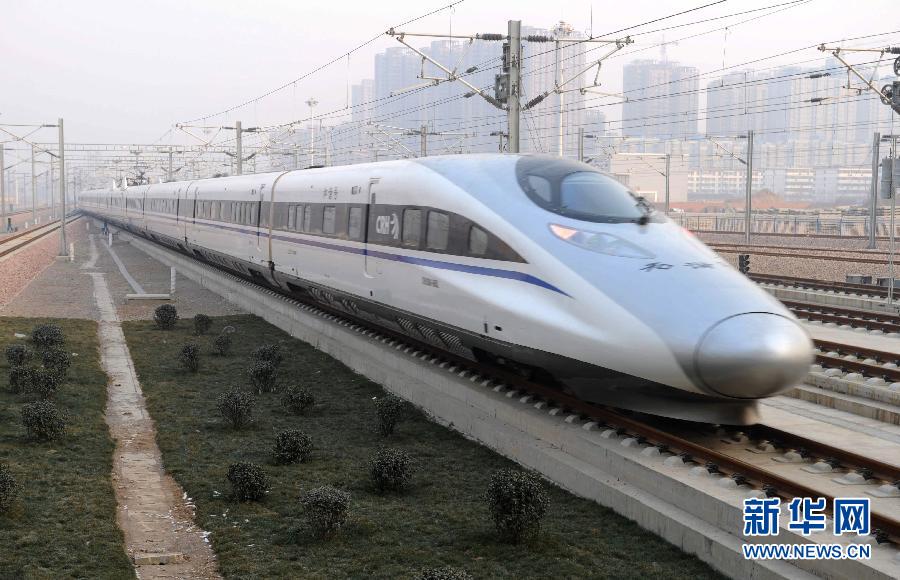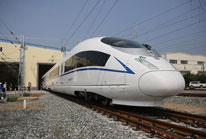


Announcement of a plan to link Kuala Lumpur with Singapore stirs public, industrial interest
Around 900 Malaysians rode the bullet train from Beijing to Tianjin on Tuesday to experience the trademark Chinese technology in the wake of last month's announcement of a planned Malaysia-to-Singapore high-speed rail link.
Fauwati Abdul Rahman, a businesswoman from Malaysia, said she was excited to ride the train.
"It is the first time I have visited China and my first time in Beijing. Actually, it my first time to take a train. In my country, I usually drive," she said.
Rahman and her friends took selfies to post on social media.
"I like the high-speed train. It is very nice and fast," she said.
Rahman was part of a trip organized by the Malaysia-China Friendship Association, which invited Malaysians-especially those with high social and economic status-to visit China and experience its high-speed rail.
"It is a great opportunity for Malaysians to experience the high-speed train since Malaysia is planning to invest in a new urban transportation system, such as the Malaysia-Singapore high-speed rail plan," said Abdul Majid Ahmad Khan, president of the Malaysia-China Friendship Association.
Most of the tour members had never been to China before, and they were interested to see the railway, Khan said.
"I have taken high-speed trains in many countries, such as in Japan and in Europe. China's bullet train is comfortable," he said, noting that China has the technology and skills to build them well.
Zhou Li, director of China Railway Corporation's science and technology administration department, said, "China has mastered world-leading technology to build high-speed railways. In addition, it has experience in various environments, including extremely hot and cold weather conditions."
China's high-speed rail network covers more than 19,000 kilometers, accounting for 60 percent of the world's high-speed rail tracks.
Last month, the Singapore and Malaysia governments announced plans for a high-speed rail linking Singapore with the Malaysian capital, Kuala Lumpur. Chinese companies have shown an interest in bidding on the project, as are others from Japan, Europe and South Korea, said Khan, who served as the Malaysian ambassador to China from 1998 to 2005.
China has eyed high-speed rail projects overseas in recent years. It built the Jakarta-Bandung railway in Indonesia and the Moscow-Kazan railway in Russia.
Khan said many factors are involved in awarding the project, including technology, finance and management.
"Whoever can offer the best package will win. China has a good chance," he said.
Many Southeast Asian countries, such as Thailand, Laos and Indonesia, also have plans to construct high-speed railways.
 World's fastest bullet train to start operating next month
World's fastest bullet train to start operating next month Huangluo: China's 'long hair village'
Huangluo: China's 'long hair village' Spectacular bridge with one of the tallest piers in the world
Spectacular bridge with one of the tallest piers in the world Magnificent view of Hukou Waterfall
Magnificent view of Hukou Waterfall A glimpse of Stride 2016 Zhurihe B military drill
A glimpse of Stride 2016 Zhurihe B military drill US Navy chief tours Liaoning aircraft carrier
US Navy chief tours Liaoning aircraft carrier Chinese American woman wins Miss Michigan
Chinese American woman wins Miss Michigan Centenarian couple takes first wedding photos
Centenarian couple takes first wedding photos Traditional Tibetan costumes presented during fashion show
Traditional Tibetan costumes presented during fashion show Top 10 livable Chinese cities
Top 10 livable Chinese cities Top 20 hottest women in the world in 2014
Top 20 hottest women in the world in 2014 Top 10 hardest languages to learn
Top 10 hardest languages to learn China’s Top 10 Unique Bridges, Highways and Roads
China’s Top 10 Unique Bridges, Highways and Roads Chinese athletes switch nationality for opportunities, welfare
Chinese athletes switch nationality for opportunities, welfare With another Olympic gold, Lang Ping rekindles national pride
With another Olympic gold, Lang Ping rekindles national pride Who holds the purse strings?
Who holds the purse strings? Chinese author Hao Jingfang wins Hugo Award for Best Novelette with ‘Folding Beijing’
Chinese author Hao Jingfang wins Hugo Award for Best Novelette with ‘Folding Beijing’Day|Week